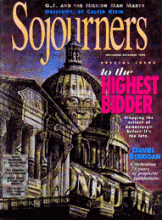"IT HAS NEVER BEEN worse here. There are more restrictions than ever before. No one can speak. No one can demonstrate. People disappear." These are the recent words of Bishop Carlos Ximenes Belo, the head of the Catholic Church in East Timor.
On December 7, 1975, Indonesia invaded the newly independent country of East Timor-with U.S. approval and weaponry. Since that time, more than 200,000 East Timorese-about one-third of the pre-invasion population-have died as a result of Indonesia's bloody occupation.
The Indonesian authorities have destroyed or driven underground all independent East Timorese institutions with the exception of the church-a beacon of hope for East Timor's embattled indigenous population. The church has become a key player in the contest between the Indonesian military and East Timor's vast resistance movement, often incurring the ire and deep suspicion of the Indonesian authorities.
Since the breakup of Portugal's colonial empire, two decades of struggle for self-determination in tiny East Timor have dramatically altered the church. Traditionally conservative and aligned with the indigenous and colonial elite, the Roman Catholic Church today identifies with the needs and wishes of the poor East Timorese majority. Whereas only one-third of the indigenous population was Catholic in 1975, today the figure stands at about 90 percent.
In 1983, Carlos Belo assumed leadership of the Catholic Church in East Timor. Despite his reputation as conservative and amenable to Indonesian interests, Bishop Belo refused to be silent about ongoing Indonesian atrocities in the territory.
In 1989, he sent a letter to then-U.N. Secretary-General Perez de Cuellar, stating, "We are dying as a people and as a nation." He called upon the world body to oversee a referendum on self-determination in the territory.
Read the Full Article

